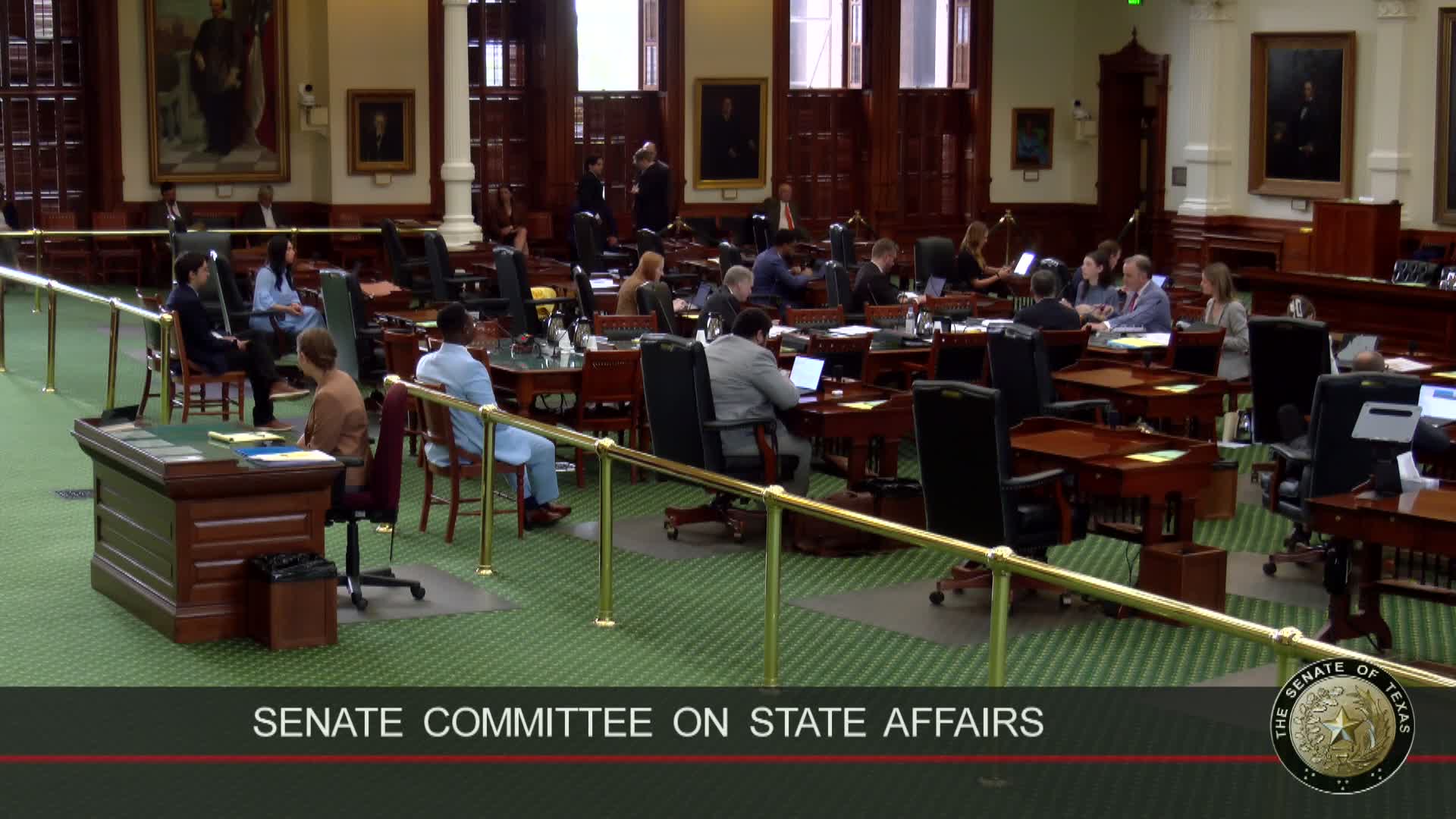Texas Senate committee hears hours of testimony on SJR 54 calling for an Article V convention
Get AI-powered insights, summaries, and transcripts
Subscribe
Summary
The Senate Committee on State Affairs heard testimony Oct. 12 on SJR 54, a proposed continuing application from the 89th Legislature asking Congress to call an Article V convention to propose amendments limiting federal power; the committee took testimony but recorded no vote.
The Senate Committee on State Affairs heard testimony Oct. 12 on Senate Joint Resolution 54, a proposed continuing application from the 89th Legislature asking Congress to call an Article V convention to propose amendments that would impose fiscal restraints on the federal government, limit federal jurisdiction and limit terms of federal officials.
SJR 54’s author, Senator Bergwall, presented the resolution as a renewal of a 2017 application and said the new measure would remove the 2017 sunset so the call would remain in effect “unless rescinded by a succeeding legislature.” Bergwall said, “SJR 54 is an application on behalf of the 89th Legislature for the Article 5 convention for those same 3 purposes.”
Why it matters: supporters said the move would pressure Washington to rein in federal power; opponents warned of a convention that could exceed its mandate or have lasting, irreversible consequences. The hearing drew seven named witnesses and more than an hour of debate on legal authority, delegate selection and the practical limits on state control of any convention.
Testimony supporting SJR 54 framed the measure as a constitutional check on an overreaching national government. James Quintero, representative of the Texas Public Policy Foundation, told the committee the federal government “is a Leviathan whose power and control exceed anything ever imagined by the framers of the Constitution” and said the states should use Article V to “reconfigure the federal government in a manner that is consistent with liberty and limited government.” John Vancompreneil, legislative liaison for Convention of States, invoked Federalist No. 85 and said state legislatures retain responsibility to check federal overreach: “That bulwark, he asserts, is the fifth article wherein the Congress and the federal government have no latitude…”
Several witnesses and some senators questioned whether states can constitutionally limit the scope of a convention and whether Congress would count nonuniform applications. Dr. Roger Absher, political science faculty at Texas University, said it is “constitutionally questionable whether state legislatures or Congress for that matter actually have the authority to call limited conventions,” and warned that variable applications have allowed Congress to ignore prior requests. Bergwall responded that standardized application language and state control over delegates are intended to prevent Congress from treating the applications as disparate.
Opponents raised practical and political concerns. Cindy Castillo of Texas Eagle Forum said Republicans remain divided on the issue and noted close internal votes at party conventions, saying the COS plank ‘‘barely passed’’ at a recent convention and that “51% of those in attendance voted against the COS plank.” Dr. Fred Costa and Steve Oglesby (who said he speaks for himself and the John Birch Society) warned of rescissions and the danger of a convention without expiration: Costa said “10 states in the past 9 years have rescinded all their Article 5 convention applications,” and Oglesby said he is “against a new application that doesn’t have an expiration date.”
Other testimony addressed safeguards and post‑convention filters. Ken Moore, who testified in support, told senators that any proposed amendments would still need state ratification and, he said, “there are a lot of filters in place that'll keep this thing from going berserk.” Speakers debated whether those filters are sufficient and how delegate selection and state rules would interact with any rules the convention or Congress might set.
What the committee did: the committee took testimony from the panel, closed public testimony and left the resolution pending. No committee vote or formal action on SJR 54 was recorded during the hearing; the committee recessed until after the Senate floor session.
The hearing record includes repeated references to earlier related measures: a 2017 application (referred to in testimony as SJR 2), an associated 2017 measure that included a sunset (referred to as SJR 38), and outside advocacy and congressional activity (witnesses referenced HCR 15 in the 119th Congress).
